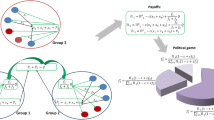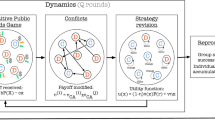Abstract
Common views identify resource abundance as the cause for the emergence of hierarchy in societies. We investigated if hierarchy may also thrive as a mechanism of redistributing scarce and variable resources, mimicking conditions of ancestral, hunter-gatherer societies. To that end, we built an agent-based model in which we compared the relative success of a comprehensive range of redistribution strategies, derived from relational models theory (Fiske in Psychol Rev 99:689–723, 1992) and explored how well populations of agents that adopt different rules for sharing resources thrive under different levels of resource availability, reflecting scarcer versus more abundant environments. Our results show that under most levels of resource availability, a population of agents that redistribute pooled resources according to individual differences in rank among the agents (i.e., reflecting an “Authority Ranking” model), was more sustainable than populations that adopted equal- and need-based sharing rules, as well as agents that did not share resources. Our results suggest that the dominant manifestation of hierarchical organization in society does not require surplus and may derive from its effectiveness in dealing with scarce resources at the group-level.
Access this chapter
Tax calculation will be finalised at checkout
Purchases are for personal use only
Similar content being viewed by others
References
Fiske, A.P.: The four elementary forms of sociality: framework for a unified theory of social relations. Psychol. Rev. 99(4), 689–723 (1992)
Haslam, N. (ed.): Relational models theory: a contemporary overview. Lawrence Erlbaum, Mahwah NJ (2004)
Hofstede, G. J., Frantz, C., Scholz, G., Schröder, T.: Artificial sociality manifesto. Unpublished manuscript (2021)
Vodosek, M.: The relationship between relational models and individualism and collectivism: evidence from culturally diverse work groups. Int. J. Psychol. 44(2), 120–128 (2009)
Boer, N.I., Berends, H., Van Baalen, P.: Relational models for knowledge sharing behavior. Eur. Manag. J. 29(2), 85–97 (2011)
Wellman, N.: Authority or community? A relational models theory of group-level leadership emergence. Acad. Manag. Rev. 42(4), 596–617 (2017)
Fried, M.H.: The evolution of political society. Random House, New York (1967)
Kaplan, H., Hill, K., Lancaster, J., Hurtado, A.M.: A theory of human life history evolution: diet, intelligence, and longevity. Evolut. Anthropol.: Issues, News Rev. 9(4), 156–185 (2000)
Kaplan, H., Gurven, M.: The natural history of human food sharing and cooperation: a review and a new multi-individual approach to the negotiation of norms. In: Gintis, H., Bowles, S., Boyd, R., Fehr, E. (Eds.). Moral Sentiments and Material Interests: The Foundations of Cooperation in Economic Life. MIT Press, Cambridge (MA) (2005)
Winterhalder, B.: Social foraging and the behavioral ecology of intragroup resource transfers. Evolut. Anthropol.: Issues, News Rev. 5(2), 46–57 (1996)
Effron, D.A., Miller, D.T.: Diffusion of entitlement: an inhibitory effect of scarcity on consumption. J. Exp. Soc. Psychol. 47, 378–383 (2011)
Van Dijk, E., Wilke, H.: Coordination rules in asymmetric social dilemmas. J. Exp. Soc. Psychol. 31, 1–27 (1995)
Osés-Eraso, N., Vildarich-Grau, M.: Appropriation and concern for resource scarcity in the commons: an experimental study. Ecol. Econ. 63, 435–445 (2007)
Kaplan, H.S., Schniter, E., Smith, V.L., Wilson, B.J.: Risk and the evolution of human exchange. Proceed. Royal Soc. B: Biol. Sci. 279(1740), 2930–2935 (2012)
Schlüter, M., Tavoni, A., Levin, S.: Robustness of norm-driven cooperation in the commons. Proceed. Royal Acad. Sci., B. 283, 2015243 (2016)
Lewis, H.M., Vinicius, L., Strods, J., Mace, R., Migliano, A.B.: High mobility explains demand sharing and enforced cooperation in egalitarian hunter-gatherers. Nat. Commun. 5(1), 1–8 (2014)
The World Bank.: Fertility rate, total (births per woman) (2019). https://data.worldbank.org/indicator/SP.DYN.TFRT.IN. Accessed 30 April 2021
Wilensky, U.: NetLogo. http://ccl.northwestern.edu/netlogo/. Center for Connected Learning and Computer-Based Modeling, Northwestern University, Evanston, IL (1999)
Von Rueden, C., Gurven, M., Kaplan, H.: Why do men seek status? Fitness payoffs to dominance and prestige. Proceed. Royal Soc. B: Biol. Sci. 278(1715), 2223–2232 (2011)
Gurven, M.: To give and to give not: the behavioral ecology of human food transfers. Behav. Brain Sci. 27(4), 543 (2004)
Hawkes, K., Hill, K., O’Connell, J.F.: Why hunters gather: optimal foraging and the Ache of eastern Paraguay. Am. Ethnol. 9(2), 379–398 (1982)
Sear, R., Lawson, D. W., Kaplan, H., Shenk, M. K.: Understanding variation in human fertility: what can we learn from evolutionary demography?. Philosophical transactions of the Royal Society of London. Series B, Biological sciences 371(1692), 20150144 (2016)
Kägi, W.: The tragedy of the commons revisited: Sharing as a means to avoid environmental ruin. IWOE Discussion Paper No. 91 (2001)
Inglehart, R.F.: Changing values among western publics from 1970 to 2006. West Eur. Polit. 31(1–2), 130–146 (2008)
Norton, M.I., Ariely, D.: Building a better America—One wealth quintile at a time. Perspect. Psychol. Sci. 6(1), 9–12 (2011)
Author information
Authors and Affiliations
Corresponding author
Editor information
Editors and Affiliations
Rights and permissions
Copyright information
© 2022 The Author(s), under exclusive license to Springer Nature Switzerland AG
About this paper
Cite this paper
Nelissen, R.M.A., Muñoz, I.A., Muñoz, D.C., Kramer, M.R., Hofstede, G.J. (2022). Efficient Redistribution of Scarce Resources Favours Hierarchies. In: Czupryna, M., Kamiński, B. (eds) Advances in Social Simulation. Springer Proceedings in Complexity. Springer, Cham. https://doi.org/10.1007/978-3-030-92843-8_1
Download citation
DOI: https://doi.org/10.1007/978-3-030-92843-8_1
Published:
Publisher Name: Springer, Cham
Print ISBN: 978-3-030-92842-1
Online ISBN: 978-3-030-92843-8
eBook Packages: Physics and AstronomyPhysics and Astronomy (R0)




